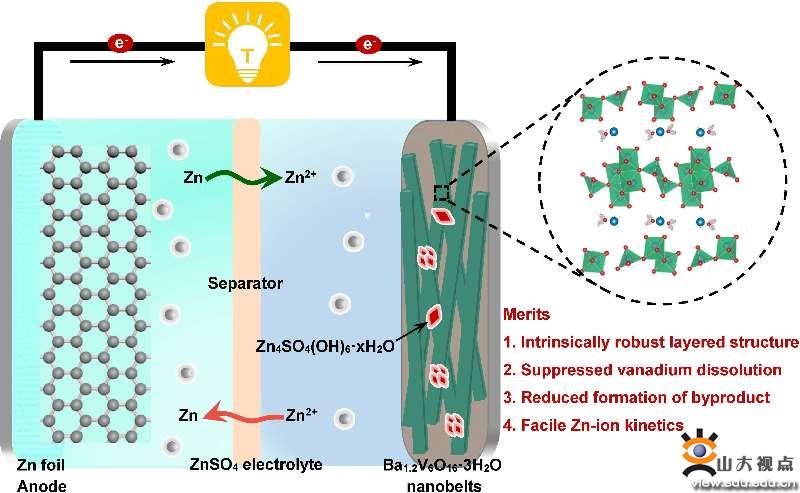Recently, Prof. Xiong Shenglin's group from School of Chemistry and Chemical Engineering of SDU made an important progress regarding the research of cathode materials in aqueous zinc-ion batteries. The research article entitled "Boosting Zinc-Ion Storage Capability by Effectively Suppressing Vanadium Dissolution Based on Robust Layered Barium Vanadate" has been published in the top journal Nano Letters (10.1021/acs.nanolett.0c00732).
Rechargeable lithium-ion batteries have been applied in large-scale for several years due to their high energy density and long cycle life. However,the limited lithium resources and the increasingconcerns inenvironmental pollution and safety caused by the organic electrolyte motivate the research aimed at the alternative battery systemswith high safety, environmental friendly, and low cost. Currently, aqueous zinc-ion batteries (AZIBs) havecaptured much attention as the emerging alternatives by using the zinc metal as the anode and aqueous solution with weak acidity as the electrolyte. But in this sysytem, the choice of suitable cathodematerials has become pivotal issue for the development of AZIBs. Among them, vanadium oxides with an open framework have successfully and effectively realized the zinc-ion storage. However, there are some intractable issues largely involving vanadium dissolution from V-O frameworks of the cathode and the formation of an electrochemically inactive byproduct during cycling that should not be ignored, which could cause severe capacity deterioration and inadequate cycle life, further limiting the large-scale applications.

Under the guidance of Prof. Xiong, the authors prepared three barium vanadate nanobelt cathodes by tuning the amount of barium precursor in a hydrothermal condition, i.e., Ba1.2V6O16·3H2O, and BaV6O16·3H2O (V3O8-type) and BaxV2O5·nH2O (V2O5-type). Benefiting from the robust architecture, layered BaxV3O8-type nanobelts (Ba1.2V6O16·3H2O) exhibit superior rate capability(108.8 mAh g−1at 10 A g−1)and long-term cyclability(capacity retention of 95.6% over 2000 cycles)owing to fast zinc-ion kinetics, enabled by efficiently suppressing cathode dissolution as well as greatly eliminating the generation of byproduct Zn4SO4(OH)6·xH2O, which have been revealed by a series of ex situ analyses andstatic soaking experiment of the electrodes.This work could provide a reasonable strategy to engineer cathode materials with robust architectures to improve the electrochemical performance of AZIBs.
In recent years, Prof. Xiong Shenglin’ group have been working on the basic and applied research of inorganic energy materials mainly in the precisely controllable synthesis of target materials in mesoscopic scale aimed at the energy storage, and have obtained a series of progress published in Angew. Chem. Int. Ed., Adv. Mater., Energy Environ. Sci., Nano Lett., Adv. Energy Mater., Adv. Funct. Mater., J. Energy Chem.,etc. The above researches have been supported by National Natural Science Foundation of China,the Taishan Scholar Project Foundation of Shandong Province, the Natural Science Foundation of Shandong Province, Young Scholars Program of Shandong University, State Key Laboratory of Crystal Materials, and the Analytical Center for Structural Constituent and Physical Property.
The full paper is linked to the website:https://pubs.acs.org/doi/10.1021/acs.nanolett.0c00732.
Written by:Xi Baojuan
Edited by: Che Huiqing